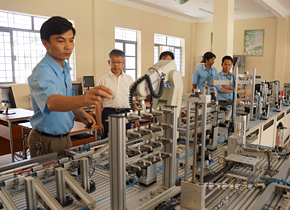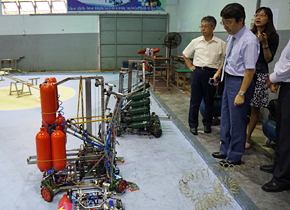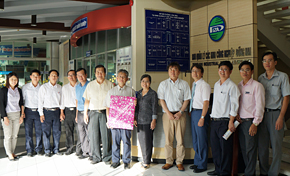Aiming for human-resource development that supports manufacturing worksites at Japanese companies expanding in Vietnam (2014-)
The Human-Resources Development Project for Manufacturing in Dong Nai Province, Vietnam, a JICA grass-roots technical cooperation project (a special allocation for regional vitalization), got under way from this fiscal year and runs for three years until 2016. Osaka Prefecture is the proposing organization. With PREX as the implementing group, the project proceeded through cooperation with local governments. Along with specialists, we visited Vietnam for a one-week period in late July to conduct a preliminary survey, in the project’s first activity.

A field trip to the Long Thanh Nhon Trach Regional Vocational College to inspect its experimental facility.
Starting from a single phone call
A single phone call from a specialist researching Japanese SMEs’ expansion in Vietnam prompted the start of this project. He inspired us to highlight our role by telling us: “In Kansai, cooperation among all sorts of institutions, information-sharing and also joint expansion actually happening with SMEs are moving forward through the Kansai-Vietnam Economic Exchange Council, based around METI-KANSAI. The next issue to be faced by these companies that are expanding in local areas will probably be with human resources. Would it be possible to harness PREX’s experience in human-resource development in this area?” In short order, we visited METI-KANSAI and Osaka Prefecture officials. We were kindly given some ideas, and as a result of the advice we decided to cooperate with the prefecture and make our proposals as a JICA grassroots technical cooperation project.
As discussions progressed concerning what aspects of globalization conducted by SMEs we should become engaged in, we realized anew that we should tackle issues through “human-resource development,” a duty that has been placed firmly at our core since our establishment. While trying to figure out what kind of cooperation should be implemented with Osaka Prefecture so that we could be utilized by a large number of SMEs in Kansai in the final stage of activities, it was decided to implement the project in Dong Nai Province, which has signed a cooperation agreement with METI-KANSAI. The project would be positioned as an initiative of the Kansai-Vietnam Economic Exchange Council. We proposed it as a JICA grass-roots technical cooperation project about a year ago, after obtaining a great deal of support from METI-KANSAI.
In this project, we are aiming to improve the curriculum and the instructors’ guidance capabilities with vocational training institutions, which play a central role for nurturing local engineers as the model schools, in order to meet the needs for technical and leadership classes of human resources at production sites, which are required by the MONOZUKURI (manufacturing) SMEs expanding into Vietnam.
- Students at Lac Hong University assemble robots. A model school and DIZA members
- Emiko Setoguchi and Yoko Sakaguchi of PREX
SMEs’ needs are revealed in the preliminary survey
We arrived in Ho Chi Minh City from Kansai International Airport in late July and went directly to Bien Hoa in Dong Nai Province. For five days, not including the final day, we were engaged in activities related to the preliminary survey during our stay in Bien Hoa. We selected two institutions, Lac Hong University and Long Thanh Nhon Trach Regional Vocational College, as the model schools.
In the survey, our aim was to check and confirm the educational curriculums of both schools, the condition of their machinery and equipment, the instructors’ guidance methods and other features, and at the same time, to confirm the issues and needs concerning human resources for Japanese SMEs expanding locally.
A large number of industrial parks have been completed in Dong Nai Province, such as Long Duc, Loteco, Amata, Long Thanh and Nhon Trach, and some Japanese manufacturing SMEs have been expanding there. In this latest trip, we visited 10 of the companies.
The human-resources needs vary among companies, based on their stage of expansion, scale, manufacturing processes and so on. But then there are also some common issues. A shortage exists of managers and human resources of the leadership class. It is difficult to deploy local graduates of vocational training institutes due to insufficient training. And there are needs related to being understood, involving the basic Japanese terminology needed for manufacturing worksites, along with 3S and 5S and safety management, which are common and necessary features at Japanese companies.
With the survey in mind, this project will devote its three years to promote the introduction of a curriculum that trains for “basic skills” needed at the worksites of Japanese SMEs, as well as building relationships and other things between the Japanese SMEs and training institutions, so that these relationships carry on after the project ends.
Seminar implemented in Japan in October
We plan to implement the seminar from October to November. It will be attended by the model schools’ management and people related to the counterpart, the Dong Nai Industrial Zones Authority (DIZA). We will press ahead with a study on modifying the curriculum, along with introducing the guidance situations at Osaka Prefecture University College of Technology and Osaka Prefectural Yodogawa Technology High School. In addition, we will introduce Dong Nai Province to companies in Kansai and plan to hold seminars so that networks can be created with the executives at the vocational training institutions.
Emiko Setoguchi, International Department




